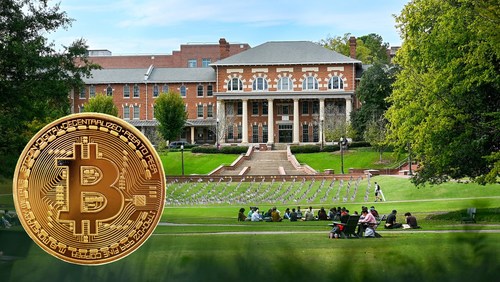RALEIGH, N.C., July 6, 2022 /PRNewswire/ — The North Carolina State University (NCSU) Computer Science Department Senior Design Center rejected and deemed a cryptocurrency project unethical for their students.
The proposed student project titled "Proof of Publishing (POP) Protocol" was submitted by the Digital Currency Monetary Authority (DCMA) based in Washington, D.C. on June 23, 2022.
The purpose of the POP Protocol is to provide an innovative incentive and monetization platform for publicists, writers, and journalists to write news articles about a company and to be compensated in cryptocurrency once proof that the article has been published online.
Companies around the world could subscribe to the POP Protocol and stake cryptocurrency to cover payments to their network of opt-in writers.
Writers could author articles at will and submit the articles to the POP Protocol. Once approved and published, a rules-based engine, determines the monetary value of the published article based on various configuration details such as word count, embedded media assets, publication, and the size of publication’s monthly readership.
The DCMA proposed to sponsor this as a computer science student project for the Fall 2022 school year.
Although the POP Protocol would be engineered to support many corporate subscribers, the DCMA is seeking to obtain proof of concept by building a global news network for its recent release of Unicoin.
Upon a committee’s review of the proposed POP Protocol, Margaret Heil, the Director of the Senior Design Center, responded "The idea of building a protocol system that would pay participants (in cryptocurrency) for favorable reviews of DCMA and Unicoin may be viewed as unethical to many of our students, and thus the project is inappropriate for our program."
The crypto industry has received a lot of scrutiny since its recent market crash led by Bitcoin with over a recent seventy percent (70%) price drop from its all-time high. This has prompted many to doubt the viability of the cryptocurrency market sector.
This raises the question of the role universities should play as intermediaries between innovation sectors and student and faculty research and development.
Darrell Hubbard, a founding member of the DCMA, received his Master of Science from NCSU and is currently a member of the NCSU Computer Science Strategic Advisory Board (SAB). He states, "I will continue to donate and to identify innovative research and development projects aligned with university and student interests."
Unicoin is a Crypto 2.0 innovation for governments and central banks and has game-changing potential for the long-term viability of the cryptocurrency industry according to the DCMA.
Cryptocurrencies are following the same innovation life cycle as the Internet.
Like Amazon, eBay, and Priceline and other companies that crashed in the dot com bubble, the most resilient and viable innovators in the cryptocurrency space will rebound.
The DCMA has introduced several banking compliant innovations with Unicoin and expects Unicoin to lead the next wave of cryptocurrency purchasing volume over the next decade and years to come.
After receiving criticism over its decision, the Senior Design Center has offered dates for a meeting in the coming weeks to discuss the project in more detail.
The DCMA is hopeful NCSU will reconsider its decision and recognize the collaborative value the DCMA, Unicoin, and NCSU students can make on the future growth and acceptance of cryptocurrencies.
According to the US News & World Report, the College of Engineering at NC State University, which includes the Computer Science Department, is ranked 25th nationally and 12th among public institutions on a list of the top graduate engineering programs in the country.
Contact:
Darrell Hubbard
Digital Currency Monetary Authority
339907@email4pr.com
704-303-5359
SOURCE Digital Currency Monetary Authority


